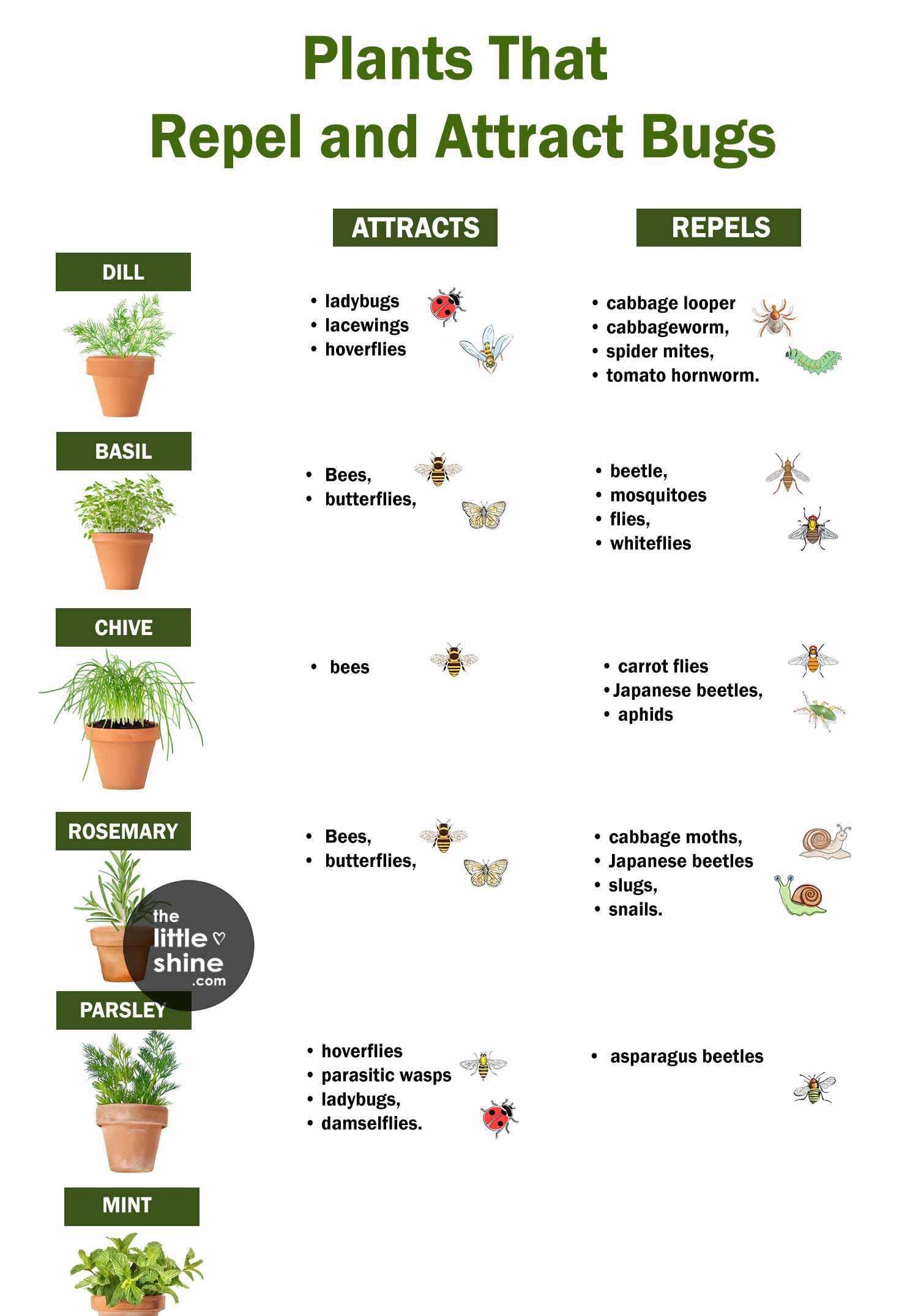What can get really irritating is bugs in and around the house. From mosquitoes, to gnats, ants, moths, wasps, flies and the list goes on, bugs are super annoying! Sometimes, some of us even succumb to bug bites, that can be painful and at times dangerous as well.

But the good part with nature is that it has solutions to offer us and, in this case, it gives us certain herbs that can repel bugs (and some that attract them as well). So, let us talk some herbs that repel bugs, so you can keep them at home and some others that attract bugs, so you can also keep these at home (as they only attract beneficial garden insects)!
Herbs that Attract and Repel Bugs
1. Dill
Dill is one such herb that is used for flavoring and seasoning food. It might have certain medicinal properties as well, that lend it as a useful ingredient in alternative medicine. The leaves Dill maybe dried or frozen for later use.
Attracts/Repels – Dill leaves have yellow flowers and attract beneficial insects, including ladybugs, lacewings, and hoverflies, which feed on aphids and other pests. Dill repels cabbage looper, cabbageworm, spider mites, and tomato hornworm.
2. Cilantro
Cilantro is a pungent herb that is easy to grow. This popular herb is used to flavor many recipes, and the entire plant is edible, though the leaves and seeds are used most often.
Attracts/Repels – When cilantro is in full bloom, it attracts certain types of flies, lady bugs, wasps, lacewings etc. But these bugs can keep insects like moths, mites, beetles, aphids etc., at bay.
3. Mint
Mint is one of the most commonly grown garden herbs. This herb adds flavor to foods and tea and is also useful for aiding digestion.
Attracts/Repels – Mint flowers are a source of nectar for beneficial insects such as bees, butterflies, hoverflies, and predatory wasps, which help pollinate nearby plants or prey on garden pests. Mint has a strong scent that can deter pests such as aphids, black flies, cabbage loopers, cabbage moths, cabbage worms, cabbage maggots, flea beetles, squash bugs, whiteflies, and ants.
4. Basil
Basil is one of the world’s most popular and widely used culinary herbs. Sweet Basil is most famous for its use in pesto. It is also used for flavoring salads, tomato sauces, soups, vegetables, chicken, egg, and fish dishes.
Attracts/Repels – Basil naturally repels asparagus beetle, carrot fly, tomato hornworm, mosquitoes, flies, and whiteflies. It also attracts bees, butterflies, and other beneficial insects to the garden.
5. Bay leaves
Bay leaves flavor is slightly bitter with a strong, aromatic quality that can be used dried or used fresh. They are often used in small amounts as a seasoning in dishes such as soups, stews, sauces, and marinades, imparting a subtle, earthy flavor.
Attracts/Repels – Bay Laurel will deter weevils and moths, so plant it in various garden areas to ward off pests. Alternatively, crush its dried leaves and spread them around to deter insects.
6. Chives
Chives have been a popular culinary herb that has a mild onion flavor to their leaves. They are used to add flavor to soups, stews, and sauces, to season omelets or scrambled eggs, to add flavor to dressings and marinades, or as a garnish for salads.
Attracts/Repels – Chives flowers attract bees and other pollinators to the garden, while their onion scent helps deter carrot flies, Japanese beetles, and aphids.
7. Parsley
Parsley cultivated worldwide for its aromatic edible leaves, which may be used fresh or dried in salads, vegetable and egg dishes, sauces or as a garnish. It is one of the most popular herbs for growing at home.
Attracts/Repels – Parsley repels asparagus beetles and attracts beneficial insects like hoverflies, parasitic wasps, ladybugs, and damselflies.
8. Rosemary
Rosemary has a strong, pungent, slightly bitter flavor and aroma, making it a popular herb in many types of cuisine. the herb also used in traditional medicine for its potential health benefits, such as its antioxidant, anti-inflammatory, and memory-enhancing properties.
Attracts/Repels – Rosemary attracts pollinators such as bees and butterflies and deters cabbage loopers, cabbage moths, Mexican bean beetles, Japanese beetles, carrot flies, slugs, and snails.
